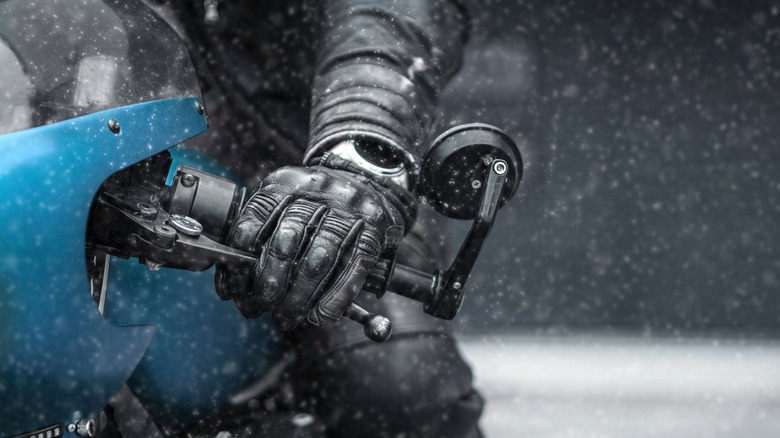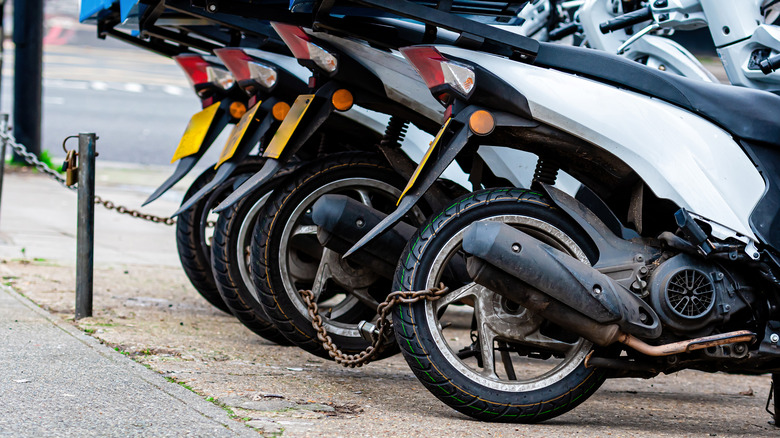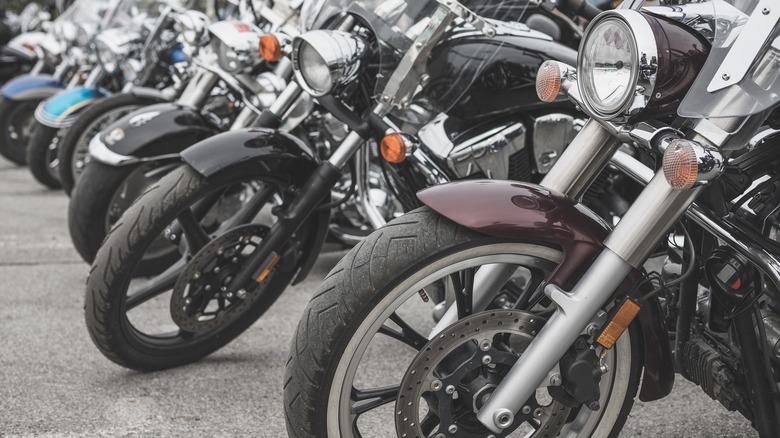What You Should Do If Your Motorcycle Is Stolen
Unfortunately, many motorcycle owners have experienced the same dreaded moment: you go outside to hop on your bike, only to realize it's not where you remember parking it. Maybe you shrug it off, assuming you put it in the garage last night but forgot, only to check and see that it is as empty as your usual parking spot. It may take a couple of minutes to come to terms with the reality of the situation, but you'll accept it soon enough — your motorcycle has been stolen, and there's a good chance you'll never see it again. What do you do now? Who do you contact?
If you're like most people, your first point of contact will probably be a friend or loved one who will get to hear your exasperated rant about thieves and your missing bike. Once you get that out of your system, though, there are a few entities you need to contact sooner rather than later if you want any chance of recovering the motorcycle — or, at least, getting reimbursed for its value so you can buy a replacement.
File a police report
If your motorcycle has been stolen, the first thing you should do is contact your local police department to file a report. There are multiple reasons for this: your insurance company will likely require a police report as part of the claims process, and by alerting law enforcement, there is a chance they may recover it. The thief may be currently driving around on your motorcycle with the license plates registered to you still on it. If that's the case and they are breaking traffic laws or causing property damage, a police report will help prove that you weren't the person operating the bike when those events occurred.
It's important to note that most places have a time limit on how long you can wait to file the theft report. If the theft wasn't violent — for example, if someone walked off with your motorcycle when you weren't looking — you'll need to call your local department's non-emergency line. In some jurisdictions, you can file a report on the police department's website, after which point someone will follow up with you to get any additional info that may be needed.
Let your insurance company know
Once you've alerted your local law enforcement agency, you'll need to file a claim with your insurance company. Though policies and procedures vary based on local laws and company rules, generally speaking, you'll need to provide a copy of the police report or give the insurance agent the case number so that they can request the information on their own. If your policy includes a loaner vehicle in the event of a theft, the insurance company will likely arrange to have a temporary replacement provided.
Assuming you have comprehensive insurance coverage, you may be cut a check for the value of the stolen motorcycle minus whatever your plan's deductible is. So, for example, if the insurance company determines that your bike is worth $4,000, but your plan has a deductible of $500, you may ultimately receive a check for $3,500. Sometimes, you may be required to pay the deductible upfront; your agent will guide you through the process.
It's a good idea to check your policy paperwork to make sure everything is covered as intended. If your bike had aftermarket accessories added, your insurance plan might cover the value of those add-ons, too, so be sure to ask your agent. Alternatively, if law enforcement manages to recover your motorcycle before any payout is made, the insurance company may instead pay to have the bike repaired, assuming the damage isn't substantial enough to write it off as a total loss.
Alert your bank (if applicable)
If the motorcycle was leased or financed, you'll also need to alert your financial institution about the theft. They will likely work directly with your insurance company to get everything squared away. Remember that any funds provided by your coverage plan may go to the bank, not you. The exact arrangement of the payout will depend on how much you had already paid on the motorcycle, assuming it was financed. The insurance company will pay off the loan, and you'll likely get what remains.
If the motorcycle was leased, you'll need to notify the leasing agency. You will be released from making the remaining payments on the bike, your insurance company will pay off your obligations, and the contract will be voided. Ultimately, the financial institution or leasing agency will walk you through whatever you need to do for your part in the arrangement, and you'll likely be given a point of contact who you'll be able to call if you have any questions or concerns.
Check online marketplaces
Unfortunately, thieves often transport stolen motorcycles to a different city or state to sell them — often after splitting them into individual parts — to decrease their odds of being discovered. However, there's a chance the person who stole your bike will try to make a quick profit by flipping it on local online classifieds websites like Craigslist and Facebook Marketplace. How it's handled may partly depend on how popular the brand is.
You should keep an eye on these sites for listings that offer the same make and model as your stolen motorcycle. If you find what you believe to be your motorcycle, you will need to contact the police rather than try to get it back yourself, as doing so could be dangerous. Look for unique identifiers that may make it easier to tell your motorcycle apart from similar ones. While thieves can remove a sticker, for example, it would be harder for the seller to hide an obvious scratch or deliberate identifying mark.
In the somewhat unlikely event that your motorcycle is recovered, you'll need to contact your insurance company to update them. Someone from the agency will likely evaluate your motorcycle to determine what damage is present and whether the bike can be repaired. In other cases, you'll pay to get it fixed, then submit an invoice to your insurance company to get reimbursed for whatever work exceeds your deductible.




